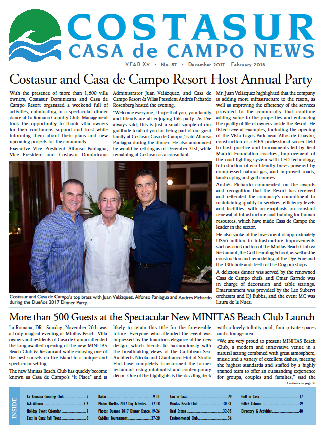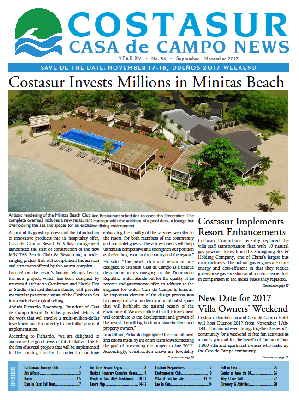As published by partner Alfredo Guzmán in Costasur Casa de Campo News, No. 57 (December 2017 – February 2018), page 29.

It has been only a few weeks since we published our initial article on new Anti-Money Laundering Law No 155-17, but changes brought by its enabling regulation, enacted by President Medina on Nov. 16, 2017, merit that we revisit this developing topic one more time, especially with regards to three key areas: a) restrictions on cash payments and rules on proof of non-cash payment for regulated operations, b) ultimate beneficiary reporting rules, and c) tax infractions threshold.
- Restrictions on Cash Payments and Rules on Proof of Non-Cash Payments
To recap, one of the main rules established by this law is that it prohibits cash payments above the following amounts for these activities:
-Payments for real estate above RD$1,000,000 (US$20,800)
-Payments for motor vehicles above RD$500,000 (~US$10,400)
-Payments for jewelry above RD$450,000 (~US$9,390).
-Payments for corporate share transfers or incorporations above RD$250,000 (~US$5,200)
Given the above, in order to register any operation involving amounts exceeding these limits purchasers must now file evidence of payment through a non-cash method at the related rentity (i.e., Registrar of Title for real estate purchases, Chamber of Commerce for share transfers, and DGII for motor vehicles).
According to the recently enacted enabling regulations, however, the cash restrictions mentioned above for said operations and thus, their respective proof of non-cash payment rules will only enter into effect once the pending internal regulations of the competent authorities are approved. These internal regulations are expected to be submitted to public consultations before the end of February 2018.
The Decree also expressly prohibits real estate Registrars from requesting additional information such as client due diligence, source of funds, etc., when it states that they would only be authorized to request proof of the non-cash method of payment in order to proceed with the operation’s registration. Approved methods of non-cash payment may include: copies of the check or other legal non-cash method of payment, wire transfer (either national or international), deposit slip made at the seller’s bank account and credit or debit card payment receipt.
-
Law No 155-17 – Ultimate Beneficiary rules
Clients with privacy and confidentiality concerns will see that new ultimate beneficiary rules will considerably limit the advantage of using corporate or trust structures for these specific purposes, as both financial and non-financial parties subject to reporting according to the law, as well as the tax office itself, will be requiring the following mandatory disclosures:
- Identity of anyone who is the ultimate beneficiary of more than 20% direct or indirect ownership of the given structure.
- If the direct or indirect ownership chain cannot be established, the person exercising legal or effective control over the structure will be considered its ultimate beneficiary; if neither of these can be established the structure’s top management officer will be deemed as the beneficiary.
- Any changes altering the ultimate beneficiary structure must be reported within 6 months.
- Threshold for Tax Offences
As mentioned in the prior issue, the new law No 155-17 includes an extensive list of 30+ crimes, including all tax offences contained in our Tax Code, which it has classified as predicate offences for money laundering (predicate offences are those whose proceeds may become the subject prosecution under our anti-money laundering statute). Now, according to our current Tax Code, any tax offence voluntary or otherwise, involving overdue taxes in the amount of approximately US$2,800. In the newly-released regulation, the government found a middle ground with the business community agreeing to classify tax offences as predicate offences for money laundering only when the amount involved surpasses 700 minimum salaries (roughly US$137,000), per fiscal year. The benefit of this new threshold will not apply if the person has already received a warning or been given notice by the Tax Office.
On a final note of direct relevance to Casa owners, all non-financial parties subject to reporting according to the law, specifically attorneys, brokers and accountants, to name a few, now have to adapt their procedures to meet with the law’s current due diligence, compliance and know-your-client procedures, while they wait for the approval of sector-specific regulations. This includes Costasur, whose top management has confirmed us that they have already retained external advisors to help them adapt their departments to the new law, including the team at Casa de Campo Real Estate, which will be able to offer their clients, be it sellers or buyers, the certainty that their operations will be handled in full compliance with the new statute.
Download PDF here



